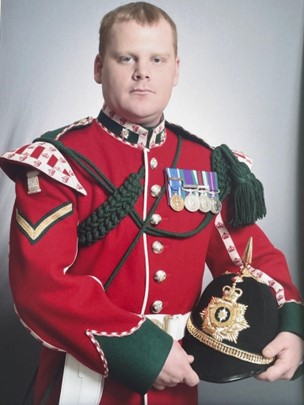An inquest into the death of a thirty-nine-year-old former soldier, has found NHS and Army failings as war veteran’s undiagnosed PTSD led to suicide.

Jonathan Philip Cole, from Ironville in Derbyshire, died as result of suicide by hanging ahead of his 40th birthday. He had served in the Armed Forces between 1997 and 2013 and developed PTSD following his tour of Afghanistan in 2009 (Herrick 10). Jonny was medically discharged with physical injuries in 2013, without a formal diagnosis of PTSD.
During the inquest, which ran for 14 days at Derby Coroner’s Court in March and April 2023 and Chesterfield Coroner’s Court in June and September 2022. The coroner heard how Jonny made multiple attempts at suicide and self-harm because of his PTSD, between 2010 and 2018.
Jonny’s widow Teresa Cole was concerned that there was no attempt to treat his mental health symptoms until nearly three years after his tour, that the treatment was minimal and proved to be insufficient. Jonny attempted overdoses in 2016 and 2018, of which the NHS were aware, and there was no referral for review by a psychiatrist or treatment.
Jonny did not receive a formal diagnosis of PTSD whilst serving and upon leaving the armed forces, no formal diagnosis of PTSD was ever given while Jonny was alive.
Teresa has waited over four and a half years for the coroners’ conclusion into his death. Teresa Cole instructed solicitors at Hugh James to represent her at the inquest, which was first opened in December 2018, but left part heard, as the coroner was not aware until the day that Jonny was a veteran. Hugh James solicitor Leigh Bowen appointed Edward Ramsay a barrister from 12KBW on behalf of the family.
Described by Teresa as a “bubbly chap” that “everyone loved”, Mr Cole did get some treatment from the military for his psychological trauma, taking part in eight sessions of “eye movement desensitisation and reprocessing therapy” (EDMR), a psychotherapy that helps people process and recover from distressing past experiences.
Mr Cole’s inquest, held at Chesterfield Coroner’s Court yesterday (Tuesday, April 25), heard how the recommended number of EDMR therapy sessions for combat trauma is between 16 and 24, significantly more than the eight he received.
Two “prevention of future death” reports will be filed by the coroner, a significant step which is rarely made following inquests, noting a number of failings in Mr Cole’s case – one for Nottinghamshire Healthcare Foundation Trust and the other for the Ministry of Defence.
Issues raised for the Nottinghamshire Healthcare Foundation Trust included ensuring adequate services for veterans in the mental healthcare system, as well as ensuring that veterans don’t end up bouncing between services due to having to make self-referrals.
Whilst Ms Cartwright, the coroner, acknowledged that the Ministry of Defence has made improvements to its training and instruction surrounding PTSD, she raised the issue of the numbers and shortage of psychologists and therapists equipped to deal with PTSD in the military.
Commenting on the verdict, Teresa Cole, Jonny’s widow, said:
“The whole inquest process has been a long journey. It has been an emotional, traumatic and exhausting process which has greatly increased the distress of the family. It could have been avoided if Jonny had received the correct diagnosis and treatment after his tour of Afghanistan.
“The lack of effective intervention from the MoD and NHS was heart breaking. I would like to thank Leigh Bowen of Hugh James and counsel, Edward Ramsay, who supported me in the best way possible and fought to achieve the outcome received. I would also like to thank the coroner and her staff for the care and attention they have shown in establishing what happened to Jonny and in making recommendations for the future. I only hope the MoD and NHS will fully implement these recommendations so that no family ever has to go through what we have endured.”
Leigh Bowen Associate at Hugh James represented the family, commented:
“It has been an honour to assist Teresa throughout this difficult inquest process. She has sought a full investigation into the sad circumstances leading to Jonny’s death. Teresa’s focus has been to raise awareness of PTSD in the military, the impact it has on the soldier/veteran and their family.
“This case highlights the importance of recognising clear symptoms of PTSD and treating effectively. More needs to be done to raise awareness of military PTSD within NHS services, so the right treatment is available for veterans. Lessons urgently need to be learned and procedures changed by both the MoD and NHS services to prevent other families facing similar tragic loss.
“Credit must be given to Teresa who has been determined to seek justice for Jonny and highlight the failings of the MoD and NHS to hopefully prevent this happening to others. I hope this decision will go some way in allowing Teresa and family to draw a line under these heart-breaking events.”

